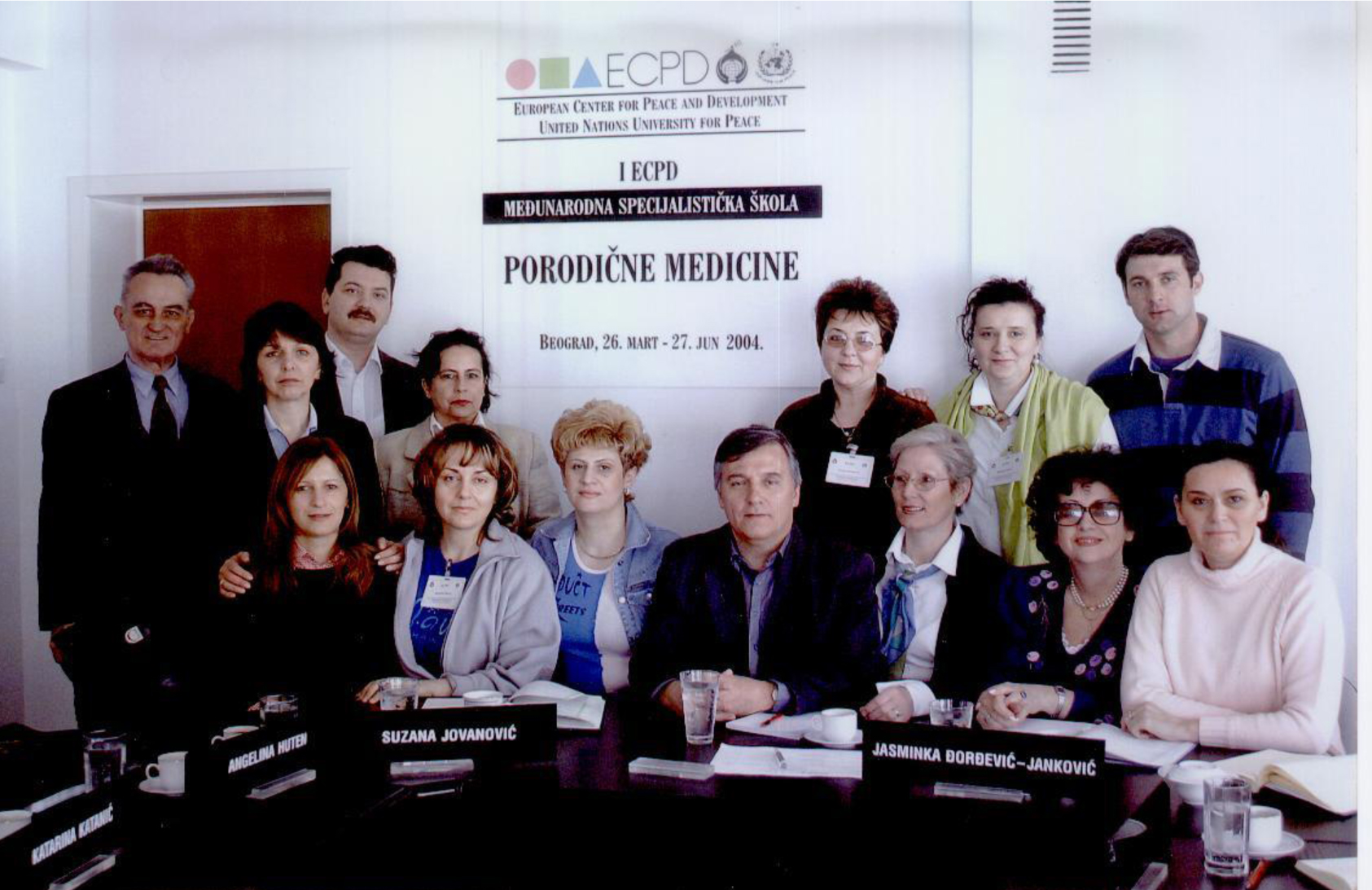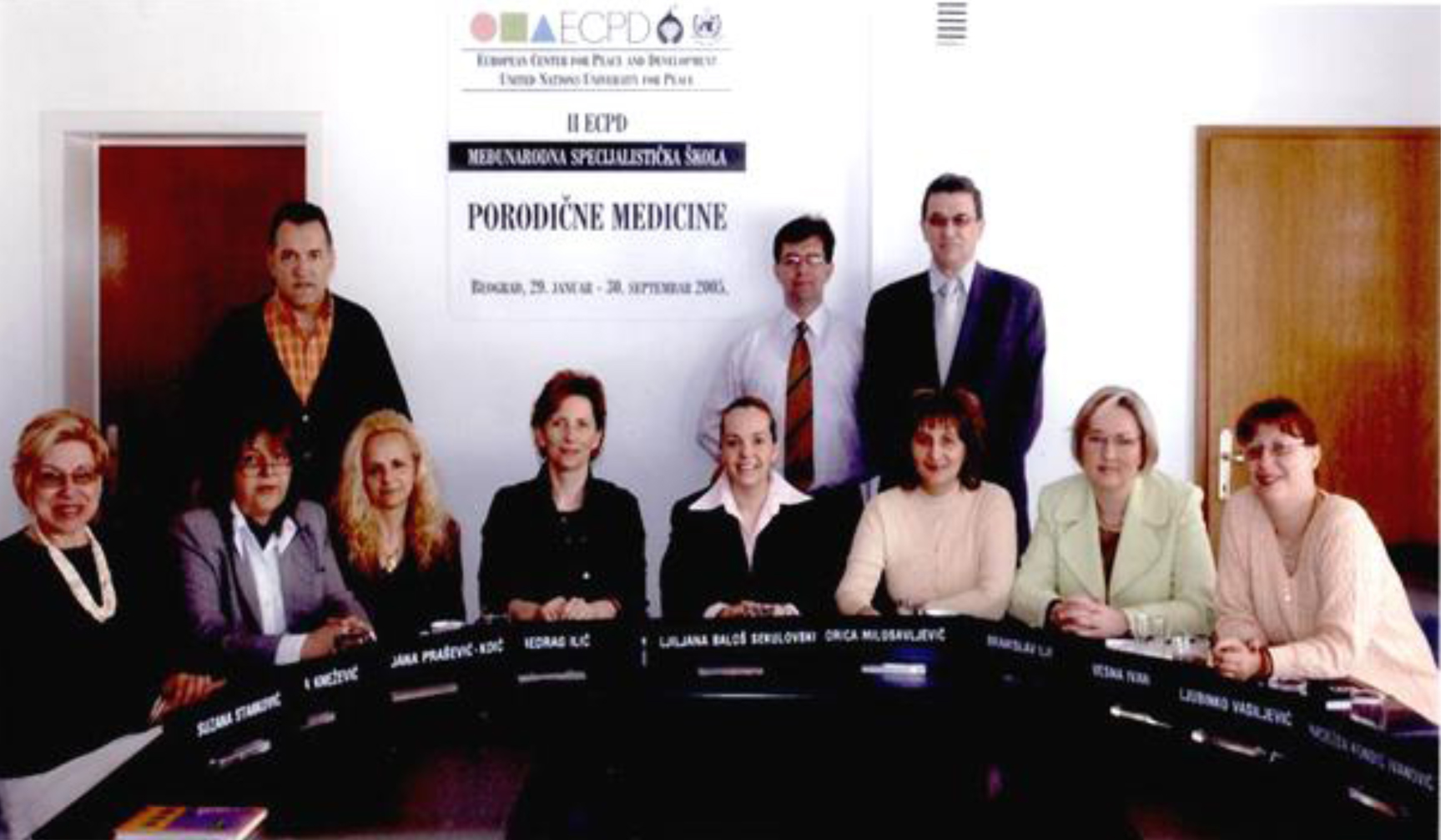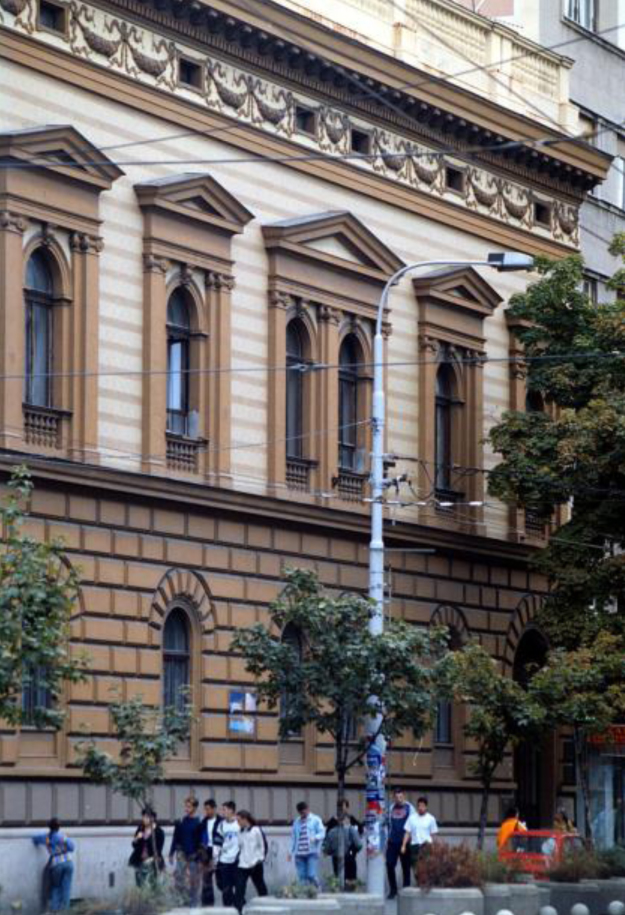
III ECPD INTERNATIONAL SPECIALIST SCHOOL OF
FAMILY MEDICINE
(Belgrade, 1 October 2022 – 30 September 2023)
BASIC DATA ON THE SCHOOL ORGANIZER
European Center for Peace and Development (ECPD) of the United Nations University for Peace
The European Center for Peace and Development (ECPD) is a regional international organization of the University for Peace established by the United Nations (pursuant to Resolution 35/55 adopted by the UN General Assembly on 5 December 1980) as “... an international center for research, higher education and postgraduate studies”. The Council of this University decided by its Resolution (UP-C2/19) to establish the European Regional Center (ECPD) and, in 1984, concluded the international Agreement with the Government of the SFR of Yugoslavia about the establishment and status of the Center with its headquarters in Belgrade. The Agreement was ratified, under the Law adopted by the Assembly of the SFRY, by the Council of the Republics and the Provinces on 28 June and by the Federal Executive Council on 17 July 1985, and has remained in force to the present day. The European Center for Peace and Development is administered by the ECPD Council seated in Paris, while its activities are managed by its Executive Director.
The European Center for Peace and Development (ECPD) of the United Nations University for Peace, with its headquarters in Belgrade, is an international, regional, university, extraterritorial organization enjoying diplomatic status, which performs its activities in the broader region covering all countries which are signatories of the Final Act of the Conference on Security and Cooperation in Europe (Helsinki, 1975).
The basic aim of the ECPD is to contribute to the promotion of peace, development and international cooperation, and its primary tasks are "to organize and conduct the corresponding postgraduate studies, research activities and dissemination of knowledge...", which contribute to the achievement of the aforementioned aim.
The ECPD devotes special attention to bringing together intellectual potentials. To that end, it organizes and conducts:
· Postgraduate specialist, master’s, doctoral and postdoctoral studies;
· Elaboration of research projects and studies devoted to the current problems of peace and development;
· Scientific meetings, symposia, seminars and conferences at which it also presents the results of its researches;
· Publishing, printing and distribution of the proceedings of scientific meetings, studies and other scientific papers relevant for the ECPD activities.
ACTIVITIES IN THE FIELD OF FAMILY MEDICINE
Within its international postgraduate studies, ECPD devotes special attention to medical and biomedical programmes (specialist studies in health care management, school of primary prevention of addiction diseases, school of clinical immunology, prevention and control of widespread non-communicable diseases, bio-regenerative medicine, school of traditional medicine, specialist seminars in the fields of laser therapy and electro-stimulation).
The First ECPD International Specialist School of Family Medicine was organized in the academic year 2003/2005. This programme of intensive education was successfully completed by the first generation of family doctors in Serbia.

The Second ECPD International Specialist School of Family Medicine was organized in the academic year 2004/2005.

INTERNATIONAL SPECIALIST SCHOOL OF FAMILY MEDICINE
European Center for Peace and Development (ECPD) of the United Nations University for Peace, within its Program of International Knowledge Transfer and as a part of its postgraduate study development plan, in the academic year 2021/2022 organizes ECPD international Specialist School of Family Medicine.
The Significance and Role of Family Doctor
Insofar as the protection of health is concerned, the reform of the health care system is based on the expansion and strengthening of primary health care, including family medicine, in accordance with the current trends in the development of medical science and technology under the present circumstances. Parallel to demographic changes, advancements in medicine, technology and informatics, health economics and health needs of citizens and their expectations, it is searching for the new method of health care delivery. Health care systems, which are based on successful primary care for family and individual, ensure better, cheaper and higher-quality health care, as compared to the systems which are not sufficiently oriented to primary care and reintegrated health care for family. Therefore, reintegrated health care for family is the basis and starting point of a reform of the health care system. It is especially important that the role of family doctor in the health care system is well understood and accepted by medical professionals, as well as by health care planners, economists, politicians and health care beneficiaries. Hence the pronounced need for the advanced training of general practitioners and specialists for the function of family doctor. As an international educational and research organization, the ECPD has been meeting the requirements of the mentioned health care reform through its activities for years. The ECPD International Specialist School of Family Medicine is just the result of that perennial work.
The multiple function of family has a significant influence on the state of health of its members, which points to the importance of integrated health care for family. Family is the most important social group which determines one’s life and development. It is the unit of health and disease.
The influence of family on health can be analyzed on several levels:
§ Through past (genetic) and medical experience, including social experiences in forming specified patterns of behavior towards health;
§ Through current exposure to environmental factors and influence altered social determinants of health
§ Through the internal functioning of family, which is linked to interaction among its members, family dynamics, division of roles in it, upbringing of children and the like:
§ Through the external functions of family, such as its communication with others, mobility, associating with others.
Primary care physicians most often encounter the problem of the chronic non-communicable diseases as well as with acute conditions and infectious diseases in communities, and often encounter family psychopathology or effects of stressful conditions in the family and that's how they learn how the health disorder of an individual affects his family and vice versa. It is well known that harmful habits and other forms of health behavior occur and are acquired in the family and that the quality of health behavior reflects special characteristics by which families differ from each other (social determinants of health). The development of a healthy way of life, formation of useful health habits and cherishing of health as the greatest value, assistance and support in the case of health disorder, development of an attitude that health behavior is a common family problem and interaction that ensures optimal functioning – represent the positive side of family medicine. The opposite characteristics designate the negative side of interaction with an unfavorable outcome. Both kinds of interaction also determine the notion of family medicine.
Family is the basic social unit which has a very important and frequently decisive role in the health and disease of its members. It provides a biological and social framework for the key events and phases of one’s life cycle: marriage, pregnancy, child birth and raising, infancy, adolescence, maturity, old age, as well as the context in which a disease occurs, develops and terminates. Accordingly, family is the primary social unit, the unit of life, health and disease and the primary unit of medical and health care.
Family health is the result of the action of past, genetic and current family experiences and conditions. The evaluation of family health, as well as the learning of the facts that influence it, comprise the set of social and medical procedures which enable the organization of health improvement and health protection measures at that level.
Family diagnosis implies the identification of those family characteristics which are known to be significant for health and disease. Those are the family structure and composition, education, performance of a role in the family, interrelationships, health behavior, financial standing of family, as well as the use of financial resources and their distribution. From an analytical viewpoint, family diagnosis implies the way in which the health of one family member may be endangered by other family members and the overall family situation.
Family health indicators can be divided into seven groups:
§ Family characteristics: size and structure;
§ Family events: divorce, death, etc.;
§ The field of functioning: communications, division of work, activities;
§ Risk indicators: genetic, nutritional, housing, social, economic;
§ Health indicators: child growth and development, positive health indicators, systematic health control;
§ Indicators of disease: incidence and prevalence of specified diseases, use of the health service, absenteeism, disability;
§ Family planning indicators: the number of children, interval between pregnancies.
Family diagnosis cannot only be made on the basis of the state of health of each individual family member: instead, the explanation is sought by means of specific family health indicators and interactions at the genetic, physical, psychosocial and emotional levels. The measurement of family health also serves for adjusting the organization of the health service to the current trends (family doctor).
The current model of family medicine has the following characteristics and functions:
§ The point of the citizen’s first contact with the health care system;
§ Continuity of health care;
§ Care coordination;
§ Provision of a wide range of medical services.
The Aim of the School
In accordance with the views of the World Health Organization (WHO), the aim of the School is that, by the nature of their activities, the future family doctors make a synthesis of therapeutic and preventive work and provide support to families in expressing their health needs to the relevant institutions, thus becoming a significant factor in the reorientation of health services. In such a context, family doctors are specific agents of strategic elements which are essential for the successful preservation and improvement of the health of the population.
Teaching
The programme includes 240 hours of theoretical instruction and 60 hours of practical work with a team of tutors. Lectures are delivered on weekends (20 hours). The work with a team of tutors is carried out in health centers and within the system of Medical Association of Private Doctors.
Admission Requirements
The School can be attended by doctors who have passed the examination of vocational ability. For admission the candidates have to submit:
- A certified copy of the university Diploma and
- A completed application form.
The tuition fee for the International Specialist School of Family Medicine is
1,350 EUR per Semester, which covers the total cost of teaching, including teaching aids, professional literature, relevant materials and additional consultations with a tutor and a team of tutors.
Curriculum
The general and specific aims of theoretical instruction are achieved with a total of 240 hours and the following subjects (fields):
· General Medicine – Family Medicine
· Standards in healthcare
· Neurology
· Psychiatry
· Internal Medicine
· Urology
· Gynecology and Obstetrics
· Pediatrics and Genetics
· Oncology
· Dermatology
· Ophthalmology
· ORL
· Rheumatology
· Physical Medicine
· Geriatrics
· Dietetics
· Complementary medicine
· Epidemiology
· Informatics
· Diagnostic techniques
· Basics of the use of ultrasound by family doctor
· Individual and family Health education as a basis of prevention
Teachers and Associates
The Co-Directors of the ECPD International Specialist School of Family Medicine are Prof. Dr. Miodrag Todorović, CEO of „Panafricare“, former Director of the Ministry of Health of Seychelles, and Prof. Dr. Jeffrey Levett, National School of Public Health of Greece, while the President of the Academic Council is Academician Prof. Dr. Vladimir Kanjuh, Director of the ECPD Biomedical and Medical Studies.
Final Examination
The assessment of the acquired knowledge, skills and adopted views upon completion of instruction consists in:
· A written test
· An oral examination
· A seminar paper and
· The assessment of practical work by a team of tutors
Diploma
The students who successfully complete the programme of instruction and pass the final examination acquire the internationally valid diploma of the European Center for Peace and Development (ECPD) of the United Nations University for Peace.
Additional Information
Further information can be obtained from the European Center for Peace and Development (ECPD) of the United Nations University for Peace, Terazije 41, Belgrade, tel: +38111/3246-041, 3246-042; fax: 3234-082, 3240-673; e-mail: This email address is being protected from spambots. You need JavaScript enabled to view it.


